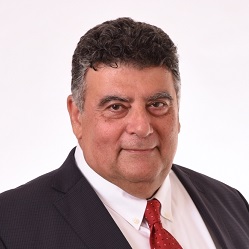
Nicolas Kalogerakis
Professor Emeritus of Biochemical Engineering
Governing Council member of the University of Patras
Biochemical Engineering and Environmental Biotechnology Laboratory
Division II: Process Development, Analysis and Design
Extended CV (pdf)
Contact
- Office: Κ1.106
- Tel.: +30 28210 37794 FAX: +30 28210 37852
- Email: nkalogerakis<at>tuc.gr, kalogera<at>gmail.com
- Personal URL: www.beeb.enveng.tuc.gr
- Office Hours: Tuesday & Thursday 11:00 to 12:00
Education
- 1983: Ph.D. in Chemical Engineering, Department of Chemical Engineering & Applied Chemistry, University of Toronto, Toronto, Ontario, Canada.
- 1979: M.Eng. in Chemical Engineering, Department of Chemical Engineering, McGill University, Montreal, Quebec, Canada
- 1977: Diploma in Chemical Engineering, NTUA
Research Interests
Current research interests focus on the following topics:
- Environmental Applications of nanobubble technology
- Marine litter - fate and biodegradation of weathered plastics & microplastics
- Combating marine oil spills and deep sea releases with biological means
- Bioremediation of soil and groundwater contaminated with hydrocarbons and xenobiotics
- Phytoremediation of areas contaminated with heavy metals (Cd, Pb, Cr) and organic compounds
- Wastewater treatment and subsequent reuse and utilization
Participation in Research Programs and Projects
Η2020 - Prima – “SPORE-MED – Sustainable upgraded WWTPs for resource recovery, water reuse and health surveillance in the Mediterranean region”, Lab budget: 330.000 € / Total budget: 3.347.684 € (2024-2027).
H2020 – ERA-MIN2, “nanoBT: Application of nano-bubble technologies to mining industry operations”, Co- ordinator, Lab budget 202.500 € / Total budget 540.000 € (2020-2023)
H2020 – R&I Action, “ELECTRA: Electricity driven Low Energy and Chemical input Technology foR Accelerated bioremediation”, Lab budget 275.625 € / Total budget 6.000.000 € (2018-2022)
- H2020 – R&I Action, “MADFORWATER: DevelopMent AnD application of integrated technological and management solutions FOR wasteWATER treatment and efficient reuse in agriculture tailored to the needs of Mediterranean African Countries”, Lab budget 215.000 € / Total budget 2.910.868 € (2016-2020)
- FP7-Collaborative Research program, “KILL•SPILL: Integrated Biotechnological Solutions for Combating Marine Oil Spills”, Co-ordinator, Lab budget 445.000 € / Total budget 8.990.000 € (2012-2016)
Distinctions and Awards
Doctor Honoris Causa awarded by the “Gheorghe Asachi” Technical University of Iasi for research contributions in the protection and restoration of the marine environment (2022).
Editor-in-Chief for the journal Microplastics since 2021 (2024 IF 5.1 & CiteScore 6.8).
Appointed by the European Commission as Sherpa in the High Level Group (HLG) on Key Enabling Technologies (KETs) for the period 2013-2015.
EC’s Environment Committee (2007-2011) – National representative for Greece (expert) - GSRT.
TU-Crete Research Excellence award (2017).
COST CA20101 “Microplastics” and COST CA20133 “FULLRECO4US”: Representative of Greece in the Management Committee (2021-2025).
Recent Publications
Seridou, P.; Karmali, V.; Syranidou, E.; Komnitsas, K.; Kolliopoulos, G.; Kalogerakis, N., “Assessment of Tamarix smyrnensis for Phytoremediation Capacity of Laterite Mine Spoils”, Plants, 14, 491 (2025).
Syranidou, E., F. Pyrilli, A. Fountoulakis, G. Constantinides, N. Kalogerakis, M. Koutinas. “Biodegradation of thermoplastic starch by a newly isolated active microbial community: Deciphering the biochemical mechanisms controlling bioprocess robustness”, Chemical Engineering Journal, 499, 155957 (2024).
Karkanorachaki, K., E. Syranidou, P.-N. Maravelaki, N. Kalogerakis, “Intertwined synergistic abiotic and biotic degradation of polypropylene pellets in marine mesocosms”, J. Hazard. Mater., 457, 131710 (2023).
Syranidou, E. and N. Kalogerakis, “Interactions of microplastics, antibiotics and antibiotic resistant genes within WWTPs”, Science of The Total Environment, 804, 150141 (2022).
Petoussi, M. A. and N. Kalogerakis, “Olive mill wastewater phytoremediation employing economically important woody plants”, Journal of Environmental Management, 302 B, 114076 (2022).
Seridou P. and N. Kalogerakis “Disinfection applications of ozone micro- and nanobubbles”, Environ. Sci.: Nano, 8, 3493–3510 (2021).
Syranidou E, Karkanorachaki, K, Amorotti F, Avgeropoulos A, Kolvenbach B, Zhou N-Y, Fava F, Corvini P and Kalogerakis N, “Biodegradation of mixture of plastic films by tailored marine consortia”, J. Hazard. Mater., 375: 33–42 (2019).
Syranidou E, Karkanorachaki K, Amorotti F, Franchini M, Repouskou E, Kaliva M, Vamvakaki M, Kolvenbach B, Fava F, Corvini PF-X, Kalogerakis N. “Biodegradation of weathered polystyrene films in seawater microcosms”, Scientific Reports, 7:17991 (2017).
Mapelli, F., Scoma, A., Michoud, G., Aulenta, F., Boon, N., Borin, S., Kalogerakis, N., Daffonchio, D., “Biotechnologies for Marine Oil Spill Cleanup: Indissoluble Ties with Microorganisms”, Trends in Biotechnology, 9: 860-870 (2017).
Kalogerakis N, Karkanorachaki K, Kalogerakis GC, Triantafyllidi E, Gotsis AD, Partsinevelos P and Fava F., Microplastics generation: Onset of fragmentation of polyethylene films in marine environment mesocosms. Front. Mar. Sci. 4:84 (2017).
Research Associates / Postdoctoral Fellows
- Dr. Evdokia Syranidou
- Dr. Petroula Seridou
Ph.D. Candidates
- Anastasia Maria Ntentaki
- Athina Stavroulaki
- Efsevia Fragkou (HFRI, Ε. Antoniou)

